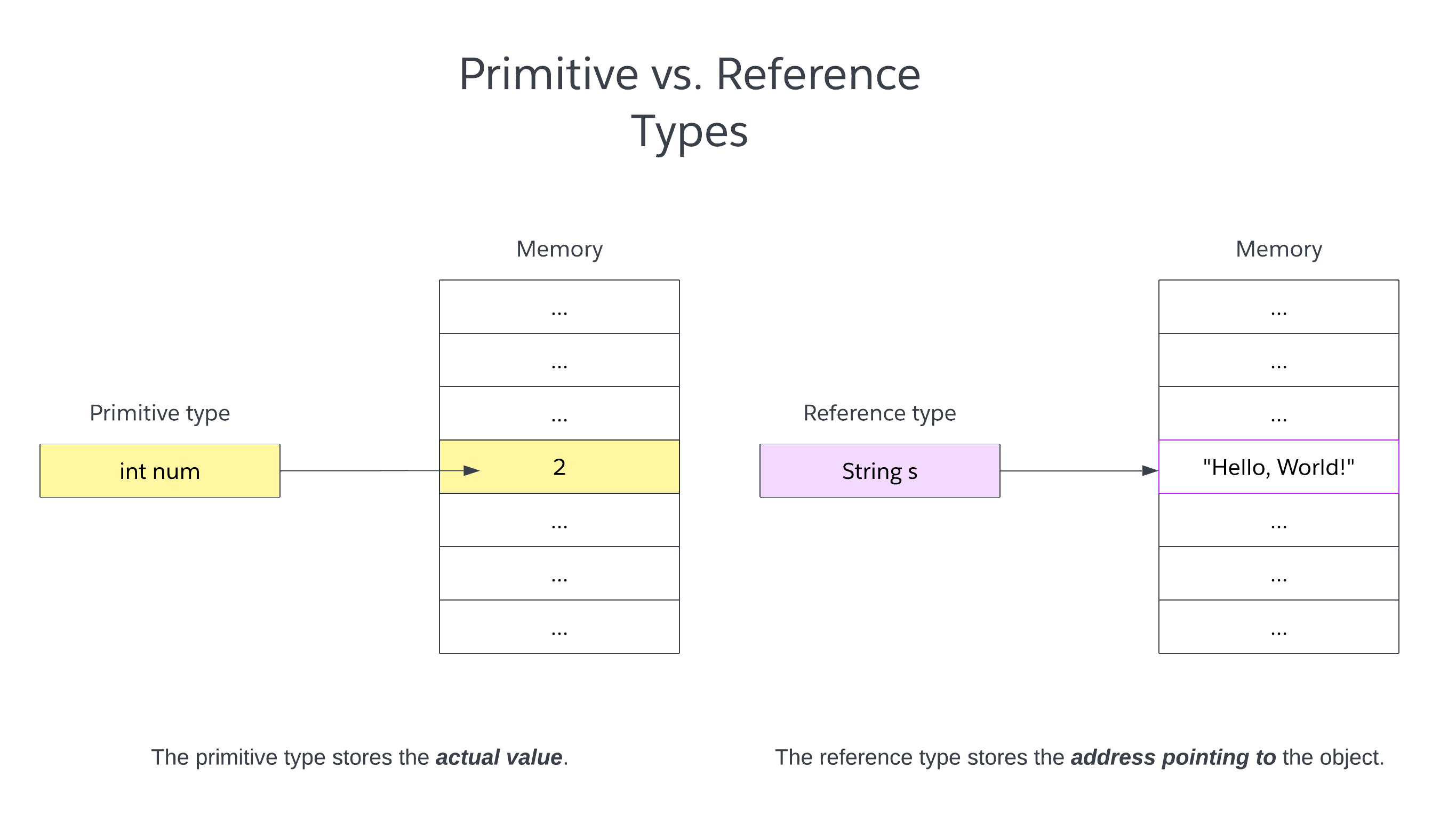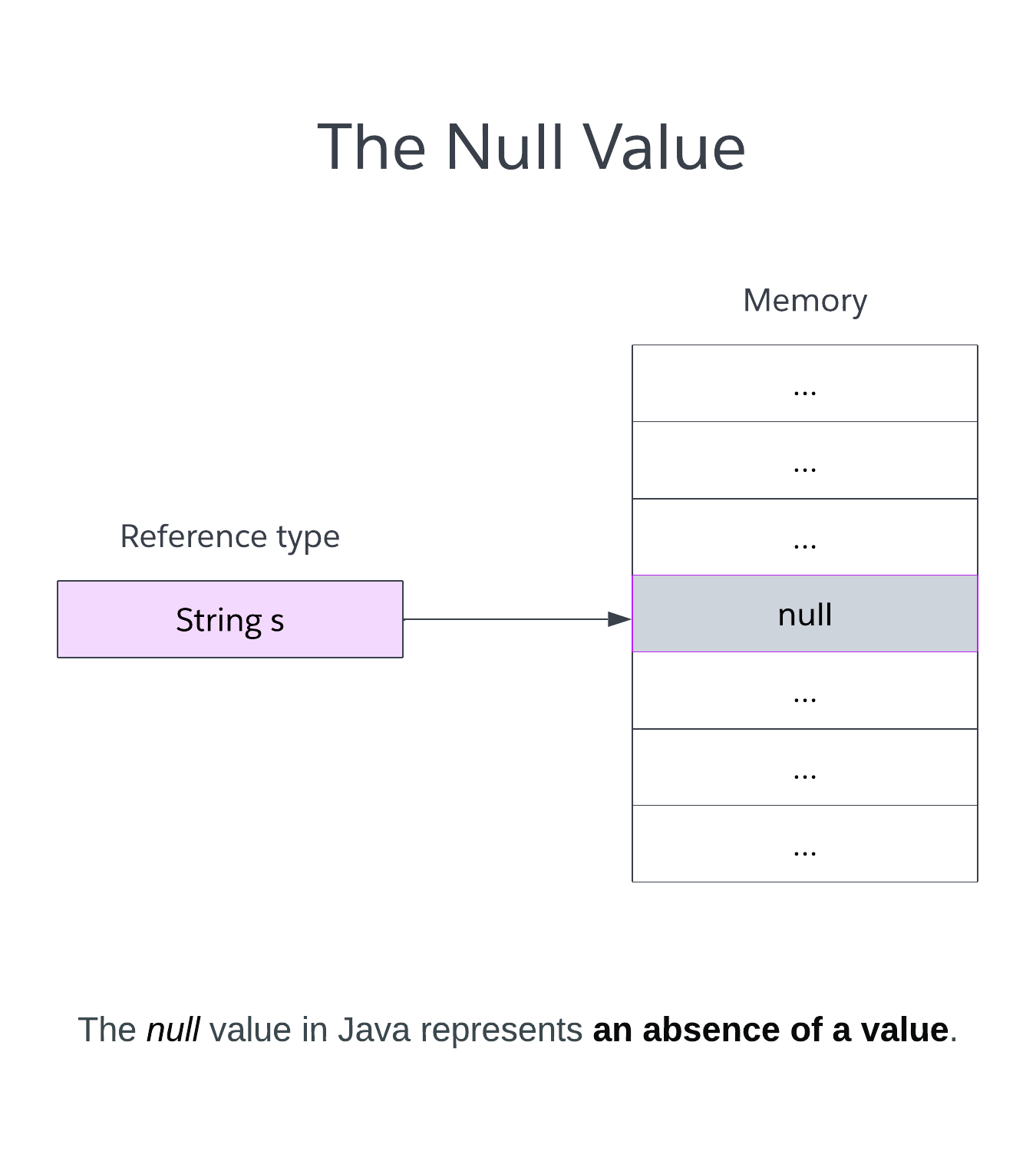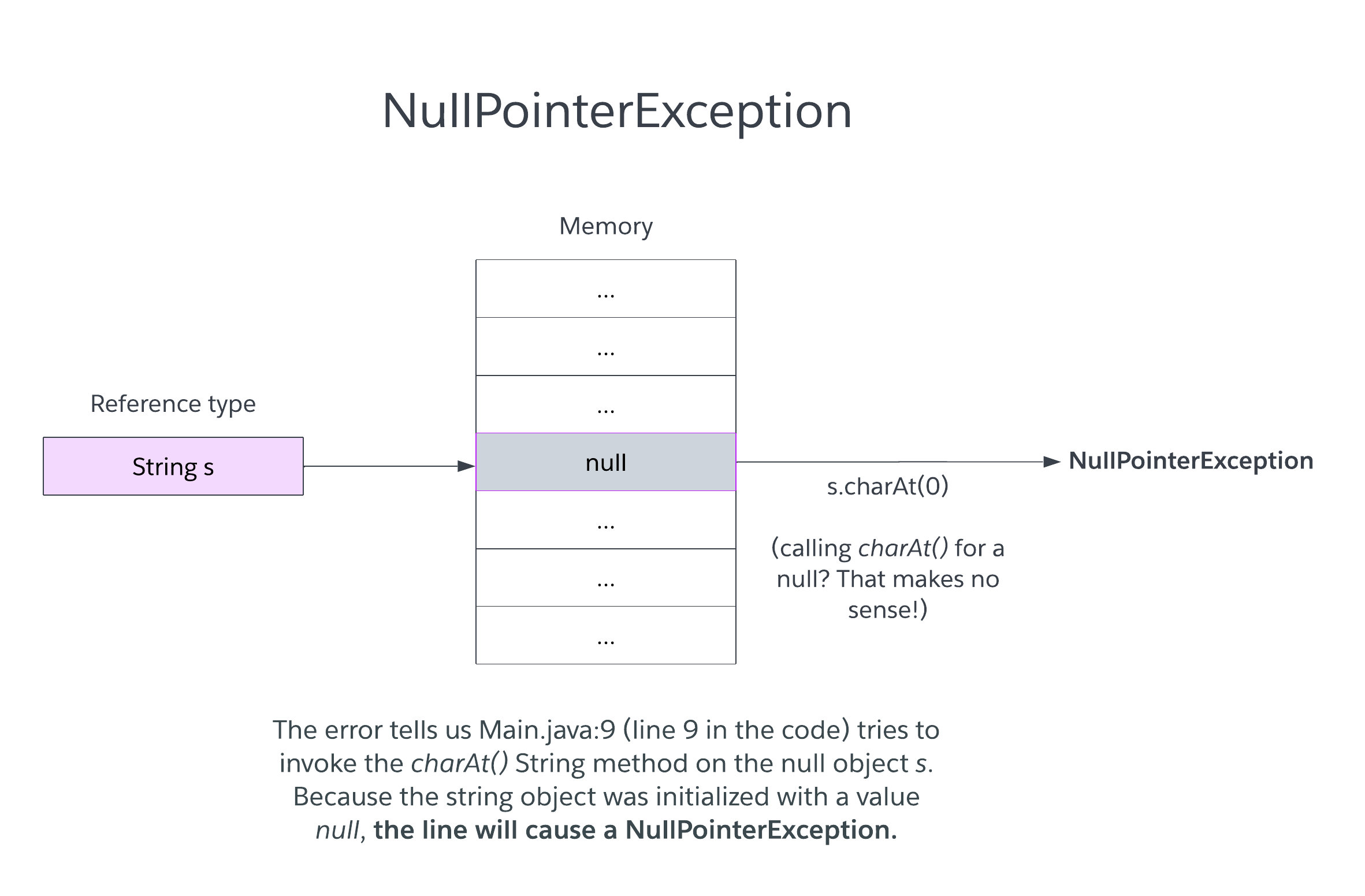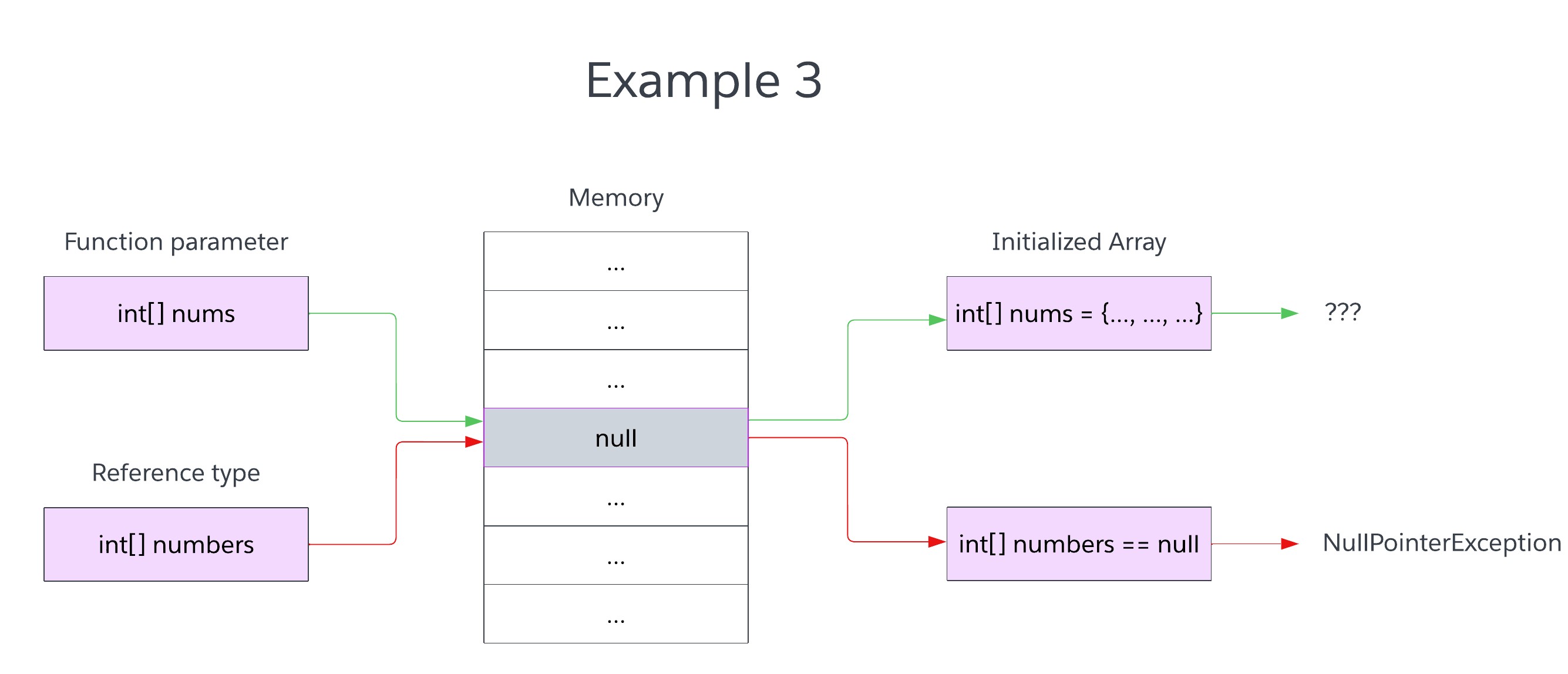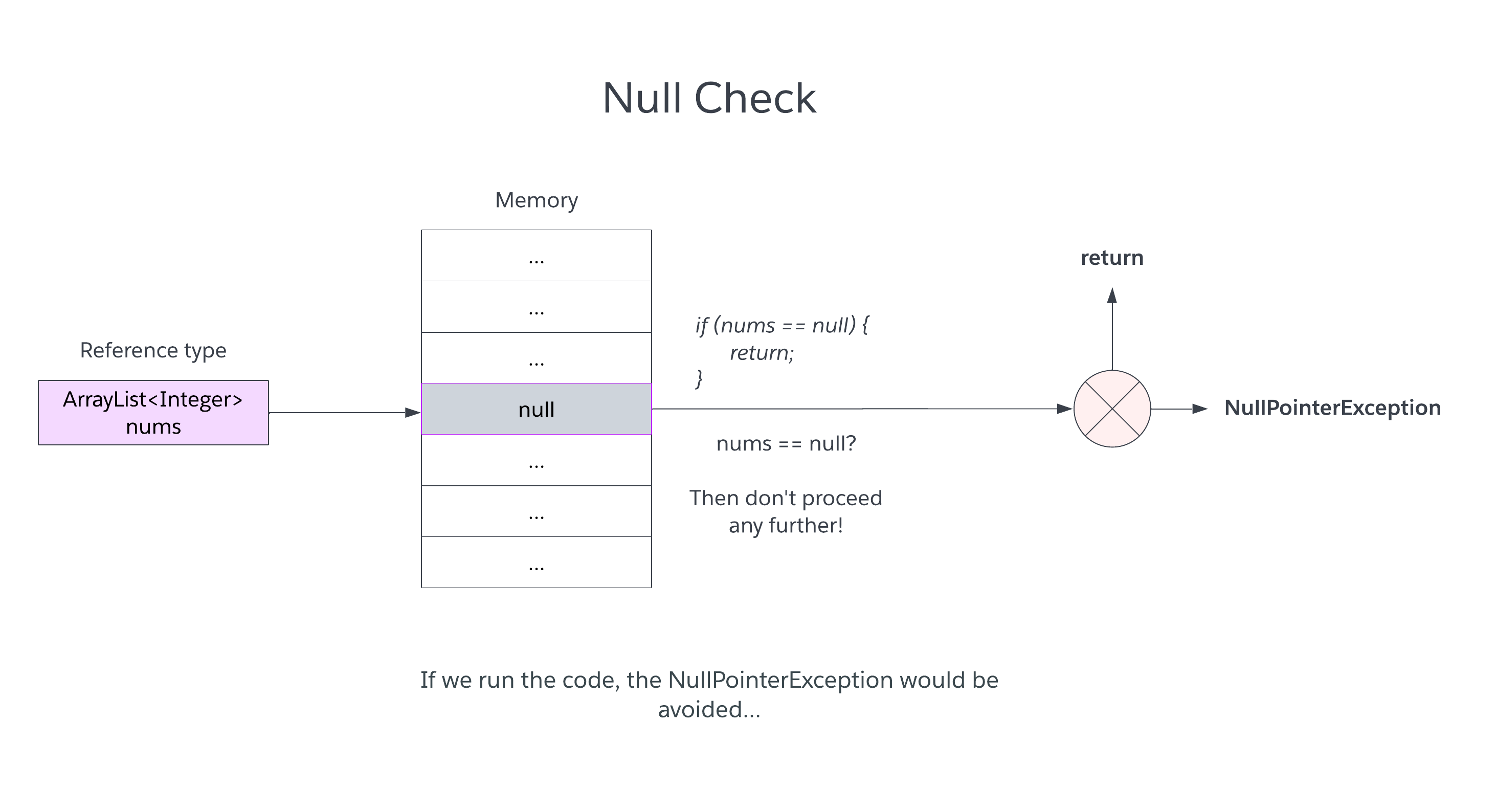- Reasons and Solutions of Null Pointer Exception in Java
- What is a Null Pointer Exception in Java?
- Reasons for Null Pointer Exceptions
- Avoiding Null Pointer Exceptions
- NullPointerException in Java
- Primitive vs. Reference Types
- The null value
- NullPointerException
- Example 1:
- Example 2:
- Example 3:
- Example 4
- Strategies in Dealing With NullPointerExceptions
- Make use of null checks
- Objects.requireNonNull()
- Conclusion
Reasons and Solutions of Null Pointer Exception in Java
In this article, we will learn about null pointer exceptions in Java and look into some of the common errors that result in them. We will also see how we can prevent them from happening.
What is a Null Pointer Exception in Java?
The Null Pointer Exception is a runtime exception in Java. It is also called the unchecked exception as it escapes during compile-time but is thrown during runtime. A program throws this exception when it attempts to dereference an object that has a null reference.
Simply put, the null pointer exception is raised when we try to call a method or variable that has a null reference.
Exception in thread "main" java.lang.NullPointerException: Cannot invoke "String.toUpperCase()" because "example.word" is null at example.main(example.java:4)
From the above code, we see that when we call the String variable word to change to the upper case, we get a null pointer exception as word has a null reference.
Reasons for Null Pointer Exceptions
Some of the common mistakes that we may commit are:
// Invoking methods of a null object class example1 < void add()< int x = 4, y = 6; System.out.println(x+y); >public static void main(String args[]) < example1 obj = null; obj.add(); >>
Exception in thread "main" java.lang.NullPointerException: Cannot invoke "example1.add()" because "" is null at example1.main(example1.java:9)
// Using or altering fields of a null object class example2 < int x = 10; public static void main(String args[])< example2 obj = null; int i = obj.x; // Accessing the field of a null object obj.x = 20; // Modifying the field of a null object >>
Exception in thread "main" java.lang.NullPointerException: Cannot read field "x" because "" is null at example2.main(example2.java:6)
// Calling length of a null array import java.util.*; class example3 < public static void main(String args[])< Scanner sc = new Scanner(System.in); int arr[] = null; System.out.println(arr.length); >>
Exception in thread "main" java.lang.NullPointerException: Cannot read the array length because "" is null at example3.main(example3.java:7)
// Using or altering the items of a null array class example4 < public static void main(String args[])< int arr[] = null; arr[2]=arr[3]+2; >>
Exception in thread "main" java.lang.NullPointerException: Cannot load from int array because "" is null at example4.main(example4.java:7)
// Throwing null value instead of a valid object class example5 < public static void main(String args[])< throw null; >>
Exception in thread "main" java.lang.NullPointerException: Cannot throw exception because "null" is null at example5.main(example5.java:4)
Avoiding Null Pointer Exceptions
Let’s discuss some situations where we can carry out some steps to prevent null pointer exceptions. Of course, we must take care of all the above-mentioned reasons.
- Inspect the arguments passed to a method
Sometimes, we may pass variables with null values to a method that results in a null pointer exception during runtime. It is always a better practice to check the arguments before proceeding to use them in the method.
Let’s look at an example,
class example_1< static int add(String s)< try< System.out.println(s.concat("HI")); >catch(NullPointerException e) < System.out.println("null value found"); >return 6; > public static void main(String args[]) < String word = null; System.out.println(add(word)); >> Using valueOf(): null Using toString(): Exception in thread "main" java.lang.NullPointerException: Cannot invoke "String.toString()" because "" is null at example_4.main(example_4.java:6)
I hope this article has helped you understand the null pointer exceptions in Java.
NullPointerException in Java
Any developer beginning their Java programming journey will inevitably come across a certain error: the NullPointerException. The NullPointerException is one of the most common errors encountered by beginner programmers when dealing with objects in Java.
So what exactly is a NullPointerException? How exactly does this error happen? What are some ways to avoid these errors?
To answer these questions, we will discuss the following concepts:
- Primitive vs. reference types
- The null value
- The NullPointerException error
- Strategies in preventing NullPointerExceptions
Primitive vs. Reference Types
In order to properly discuss NullPointerExceptions, we must first review the difference between primitive and reference types.
Primitive data types are data types that have built-in values determined by the Java programming language. When assigned a primitive-type value, a variable stores the actual value itself. For instance, the statement:
stores the integer value «0» into the primitive type variable «num».
Primitive data types are usually denoted in lowercase letters, such as:
Reference types, by contrast, store the addresses of objects, not actual values. When invoked in Java, these variables reference the memory address for an object. One example is the statement:
In this case, the variable s is a reference type, pointing to the memory address of the string literal «Hello, World!».
Reference data types are usually classes, either user-defined or built into the Java programming language. Examples include:
So what does this have to do with the NullPointerException?
Unlike primitive types, reference types can be declared null.
The null value
The null value in Java represents an absence of a value.
Null values can be assigned to reference types in assignment statements:
Assigning a value null to a variable is essentially saying, «I’ve made a variable that points to nothing.»
As mentioned before, arrays are reference types. Therefore, variables pointing to arrays can also be designated null:
NullPointerException
With the concepts of primitive/reference types and the null value discussed, we can finally now talk about NullPointerExceptions.
A NullPointerException happens when a reference variable is used or accessed that is actually null.
This can happen in several ways, including:
- Calling a method associated with the null object
- Accessing or modifying properties of the null object
One of the simplest ways a NullPointerException can happen is the following scenario:
Example 1:
If you were to compile and run the above code, the terminal output will look something like this:
Exception in thread "main" java.lang.NullPointerException: Cannot invoke "String.charAt(int)" because "" is null at Main.main(Main.java:9) The error tells us Main.java:9 (line 9 in the code) tries to invoke the charAt String method on the null object s. Because the string object was initialized with a value of null, the line will cause a NullPointerException.
Similarly, if a null value is passed into a function that assumes it’s an object, that can also produce a NullPointerException.
Example 2:
import java.util.ArrayList; public class Main < /** * Puts a number into the list if it * doesn't already exist. * @param nums - an ArrayList of numbers * @param number - some intger to put into the list */ private static void putNumber(ArrayListnums, int number) < // checks if number exists in list, // then puts the number into the // list if (!nums.contains(number)) < nums.add(number); >> public static void main(String[] args) < // the ArrayList is actually null ArrayListnums = null; putNumber(nums, 10); > > Compiling and running the code will result in the following error:
Exception in thread "main" java.lang.NullPointerException: Cannot invoke "java.util.ArrayList.contains(Object)" because "" is null at Main.putNumber(Main.java:14) at Main.main(Main.java:23) The error tells us that the error originated at line 14 of the code (which belongs to the function putNumber() we defined). Because we passed a null object as a parameter, the function throws an error when it tries to invoke add() on nums.
However, things are not always so simple, such as this code:
Example 3:
import java.util.Random; public class Main < /** * Checks if the numbers are all odd. * @param nums - the array holding the numbers. * @return true if all numbers are odd, false otherwise. */ private static boolean isAllOdd(int[] nums) < // if any of the numbers has a remainder // of 0 when dividing by 2 (aka it's even), // then return false (they're not all odd) for (int i = 0; i < nums.length; i++) < if (nums[i] % 2 == 0) < return false; >> // return true (they're all odd numbers) return true; > /** * Function intended to initialize an array * of size "size" with random numbers. * @param nums * @param size */ private static void initializeNums(int[] nums, int size) < // initialize the nums array, setting it from // null to an actual object nums = new int[size]; // initialize random object to generate random // integers Random random = new Random(); // generate numbers until the nums array // is filled with integers for (int i = 0; i < nums.length; i++) < nums[i] = random.nextInt(); >> public static void main(String[] args) < // initialized to null int[] numbers = null; // initialized to some array of integers initializeNums(numbers, 10); // it should print either "true" // or "false", right. // right. System.out.println(isAllOdd(numbers)); >> At first glance, the code seems completely fine. We seem to have taken care of the null issue by initializing the numbers array to an actual array of 10 numbers. Thus, after compiling and running the code, the terminal should be able to print either «true» or «false».
Exception in thread "main" java.lang.NullPointerException: Cannot read the array length because "" is null at Main.isAllOdd(Main.java:13) at Main.main(Main.java:55) It’s not immediately clear why this example outputs a NullPointerException. After all, the code clearly passes the reference numbers to the initializeNums() method.
That is because Java passes by value, not by reference.
It means that, for a given function (take, for instance, our initializeNums() function), Java actually allocates new memory for the function parameters (it creates space for nums and size).
That’s fine for the size parameter because we only really care about the actual value anyway. However, the nums parameter is the one being initialized, NOT the the original numbers array. Therefore, since numbers is still null, calling isAllOdd() on numbers will cause a NullPointerException.
Example 4
At first glance, the code seems to look fine. Since array was initialized as a String array of size 10, each entry should have an empty string. Therefore, comparing the first entry in the array with an empty string should print «true», right?
Exception in thread "main" java.lang.NullPointerException: Cannot invoke "String.equals(Object)" because "[0]" is null at Main.main(Main.java:8) Each entry in the array is a reference type. Entries in primitive type arrays are automatically initialized to some value (by virtue of primitive data types being pre-defined); however, entries in reference type arrays are simply given null values. As a result, an initialized array of reference types will actually contain entries with all null values.
Strategies in Dealing With NullPointerExceptions
With that said, what are some possible ways a programmer can catch null values where they shouldn’t be?
First, we can implement checks for any functions that make use of reference types.
Take, for instance, Example 2. We can add if statements before the putNumber() function that check whether or not any reference type parameters are null:
Make use of null checks
import java.util.ArrayList; public class Main < /** * Puts a number into the list if it * doesn't already exist. * @param nums - an ArrayList of numbers * @param number - some intger to put into the list */ private static void putNumber(ArrayListnums, int number) < // checks if the list is null. If yes, // then return without doing anything // (or handle it some other way) if (nums == null) < return; >// checks if number exists in list, // then puts the number into the // list if (!nums.contains(number)) < nums.add(number); >> public static void main(String[] args) < // the ArrayList is actually null ArrayListnums = null; putNumber(nums, 10); > > If we run the code, the NullPointerException would be avoided, or a programmer may choose to do something else when a null object is passed (i.e. they may throw some kind of exception).
Another way to avoid NullPointerExceptions is to make use of the function Object.requireNonNull(). This requires any object passed into the method to be not null; otherwise, the method will throw a NullPointerException.
Objects.requireNonNull()
import java.util.ArrayList; import java.util.Objects; public class Main < /** * Puts a number into the list if it * doesn't already exist. * @param nums - an ArrayList of numbers * @param number - some intger to put into the list */ private static void putNumber(ArrayListnums, int number) < // checks if the list is null. If yes, // then the method will throw a NullPointerException. Objects.requireNonNull(nums); // checks if number exists in list, // then puts the number into the // list if (!nums.contains(number)) < nums.add(number); >> public static void main(String[] args) < // the ArrayList is actually null ArrayListnums = null; putNumber(nums, 10); > > When the null nums list is passed into Objects.requireNonNull() (and an exception is thrown), the programmer can pinpoint where the exception took place and find out where the null value originated. Null checks such as these are especially invaluable for Java newcomers who have yet to encounter a subtle bug like the one in Example 3.
Programmers can also take preventative measures while coding to ensure that a reference variable is initialized correctly. Take, for instance, Example 3. Since we now know that the code won’t work, what can we do?
One solution is this: instead of initializing the array inside the function, we can return the initialized array and set the original array to said returned value, like so:
import java.util.Random; public class Main < /** * Checks if the numbers are all odd. * @param nums - the array holding the numbers. * @return true if all numbers are odd, false otherwise. */ private static boolean isAllOdd(int[] nums) < // if any of the numbers has a remainder // of 0 when dividing by 2 (aka it's even), // then return false (they're not all odd) for (int i = 0; i < nums.length; i++) < if (nums[i] % 2 == 0) < return false; >> // return true (they're all odd numbers) return true; > /** * Function intended to initialize an array * of size "size" with random numbers. * @param nums * @param size * @return int[] of initialized numbers. */ private static int[] initializeNums(int size) < // initialize the nums array, setting it from // null to an actual object int[] nums = new int[size]; // initialize random object to generate random // integers Random random = new Random(); // generate numbers until the nums array // is filled with integers for (int i = 0; i < nums.length; i++) < nums[i] = random.nextInt(); >return nums; > public static void main(String[] args) < // initialized to null int[] numbers = null; // the original array is set equal to // the initialized array numbers = initializeNums(10); // now it should print "true" or // "false" System.out.println(isAllOdd(numbers)); >> This in turn generates either «true» or «false», depending on what numbers your program chose randomly. Regardless, the important part is that the NullPointerException was avoided successfully.
In addition, every entry in a reference-type array should be initialized, in addition to the array itself. Take, for instance, a reworked Example 4:
public class Main < public static void main(String[] args) < // initializes a String array of size 10 String[] array = new String[10]; // initializes EACH entry of the String array for (int i = 0; i < array.length; i++) < array[i] = ""; >// now, the console should print "true" System.out.println(array[0].equals("")); > > Initializing every entry in the String array ensures that the entries are not null. In turn, the NullPointerException is avoided.
NOTE: Nowadays, development environments, such as Visual Studio Code and IntelliJ, have features that can detect possible NullPointerExceptions. Often, a certain variable or line of code will be highlighted with a warning saying something along the lines of: «this may cause a NullPointerException.»
Conclusion
So what have we learned today?
- Primitive types store actual values, whereas reference types store addresses to objects.
- Reference types include items such as built-in classes (String, ArrayList, etc.), uesr-defined classes, and arrays of values, primitive or reference.
- A null value is an absence of value assigned to a reference variable.
- Primitive types cannot have value null; by contrast, reference types can have the null value.
- A NullPointerException takes place when a reference variable is used or accessed that has actually been assigned null.
- Programmers can use a variety of strategies to deal with NullPointerExceptions, such as null checks, Object.requireNonNull(), and other conscientious programming practices.

